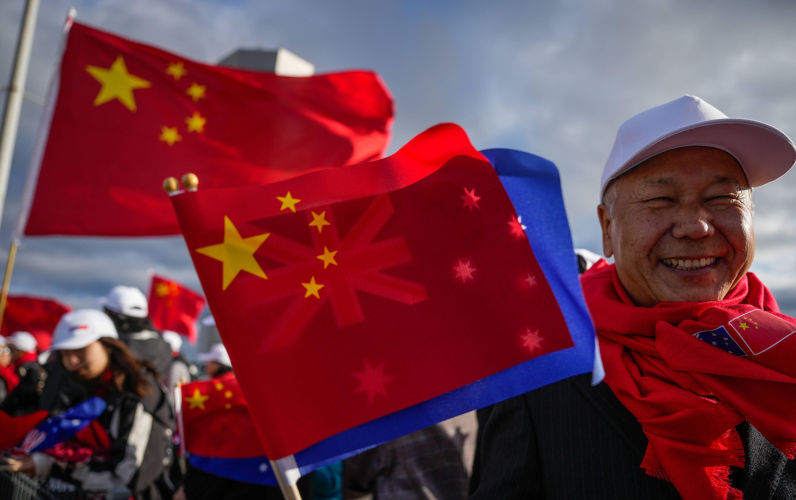Why bagging China could deny Dutton crucial votes he needs to win
April 16, 2025
China seems to play a central role in American and Australian elections.
Remember Donald Trump in his first, successful, tilt at the US presidency repeatedly belting out the word “CHINAH!”?
And here in Australia in the 2022 federal election, China featured prominently in Coalition campaigning as a threat to Australia’s freedom.
It’s on again. Crew on a Chinese vessel that undertook joint research with New Zealand scientists had the audacity to sail home in waters to the south of the Australian continent, which it had every legal right to do.
Peter Dutton was quickly out of the blocks, accusing Anthony Albanese of weakness. For what? Not ordering the vessel’s interception?
It’s straight out of the conservative playbook – recognise that fear is a strong motivator in outer suburban electorates where voters are too busy trying to survive and, hopefully, get ahead to spend time on politics.
The conservative playbook is to identify an “other”, a threat, from which the conservative party will protect disengaged voters while the progressive party will aid and abet it.
Remember the hysteria about asylum-seekers in the early 2000s, their “peaceful invasion”?
And who could forget the horrible people who allegedly threw their children overboard, only for the publis to later learn it didn’t happen at all?
Remember, too, in the last election campaign, the threat to national security posed by the two Sri Lankan female children being supported by the people of Biloela?
And Dutton’s intervention in the Victorian state election when he warned that fear of African gangs was preventing Melburnians going out to dinner?
But is the demonisation of Chinese people as clever as the Coalition seems to believe?
In 2020, relations between the Morrison Government and China sank so low that China imposed punitive tariffs on Australian wine, barley, beef and lobster.
The Albanese Government adopted a different approach in dealing with China, agreeing when it could, disagreeing where it must and protecting Australia’s national interests.
Trade Minister Don Farrell, Foreign Minister Penny Wong and Albanese, himself, engaged respectfully with their Chinese counterparts. China has since removed all those tariffs.
And the Australia China High-Level Dialogue that was suspended in 2020 has resumed.
While the berating of China by the Morrison Government might not have been in Australia’s national interest, it is also evident that it wasn’t in its political interests.
Seats with a large representation of Australian-Chinese voters are Chisholm in Victoria, Bennelong on Sydney’s north shore, Reid in Sydney’s inner-west and, to a lesser extent, Tangney in Western Australia. In the 2022 election, the Liberals lost all four.
These voters usually have family members in China, many do business with China, and none take kindly to the demonisation of China.
Another seat with a large Australian-Chinese population is Bradfield, on Sydney’s upper north shore.
Liberal member, Paul Fletcher, is not contesting so the benefit of incumbency is lost. And the new Liberal candidate is contesting against a Teal candidate who has campaigned as “the shadow member for Bradfield” since the last election.
As Dutton seeks an “other” to demonise in the hope of gaining seats from Labor, he might want to reconsider selecting China as the threat to those constituents.
As the Trump tariffs wreak economic havoc around the world, Australia would be wise to maintain its improved relationship with China.
We will have our differences — that is understood by both sides — but China is a far more important trading partner for Australia than the US.
Here’s a prediction – China will step up as a global citizen, supporting the rules-based trading system operated by the World Trade Organisation.
The reason the rules-based system was created with American leadership, just three years after the end of World War II, was to avoid World War III. Member countries figured they were better off trading with each other than invading each other.
Graphic evidence of China stepping up as a global citizen was a photo taken last week of the trade ministers of China, Japan and South Korea as they pledged to work more closely with each other.
Those three countries have a fraught history, but they have decided not to let it dominate their future relationship.
Australians know China is an important customer for our iron ore, gas and prime agricultural produce. Australia is a favoured destination for Chinese tourists and a place where Chinese university students come to study.
Australian Governments can, and should, act where they have legitimate concerns.
On 11 April, the Albanese Government announced it would return the port of Darwin to Australian ownership; it was leased for 99 years by Chinese firm Landbridge.
The lease was granted by the Northern Territory during the period of the previous federal Coalition Government when Dutton was minister for border protection.
Whether it’s swarthy asylum-seekers, little girls born in Biloela, African gangs or Chinese scientific research vessels, Dutton will try to portray them as a threat to the safety and security of Australians.
But in doing so he might just be surrendering four or more marginal seats to Labor. And while the Coalition might nevertheless consider demonising China to be in its political interests, it is certainly not in the national interest.


